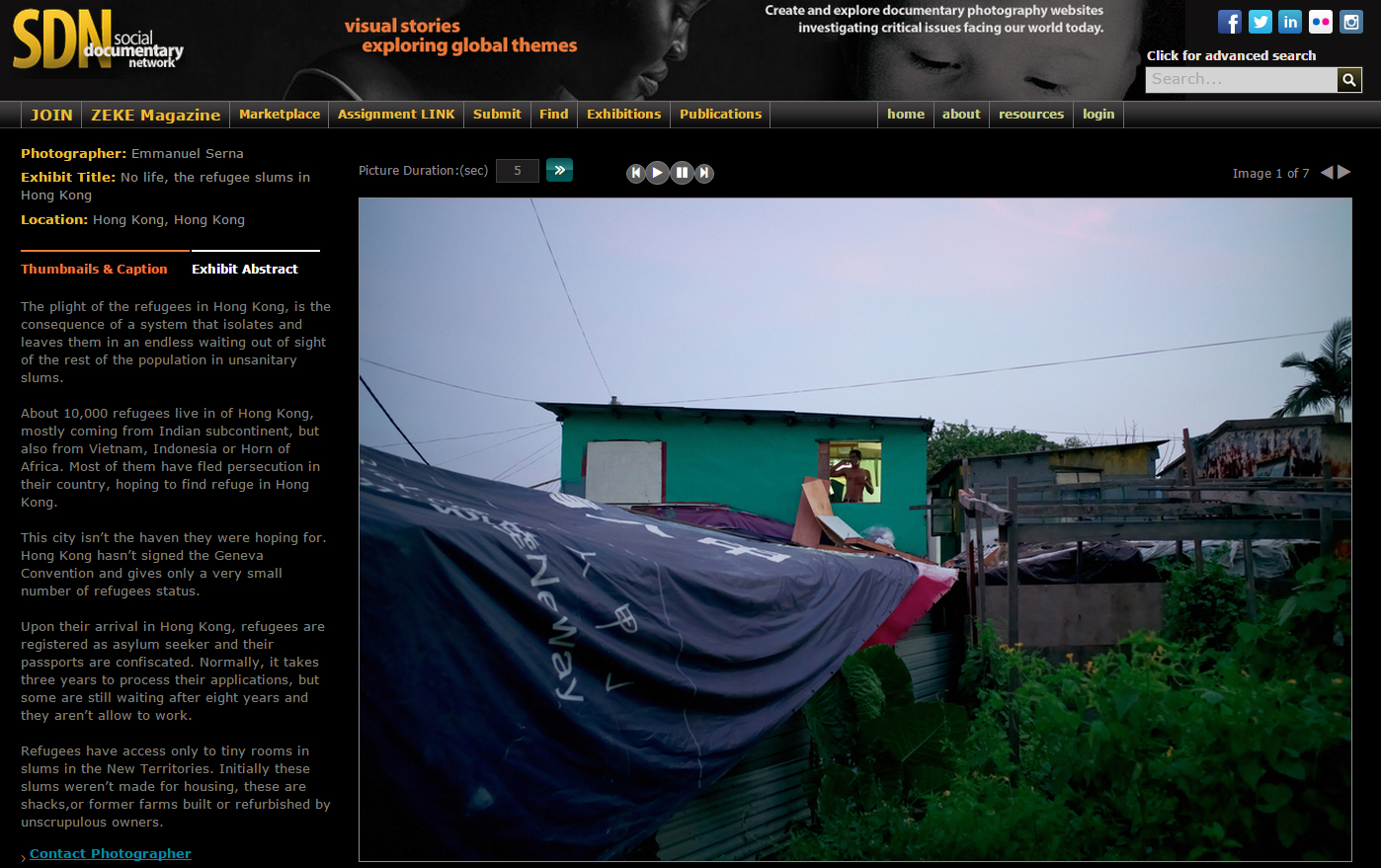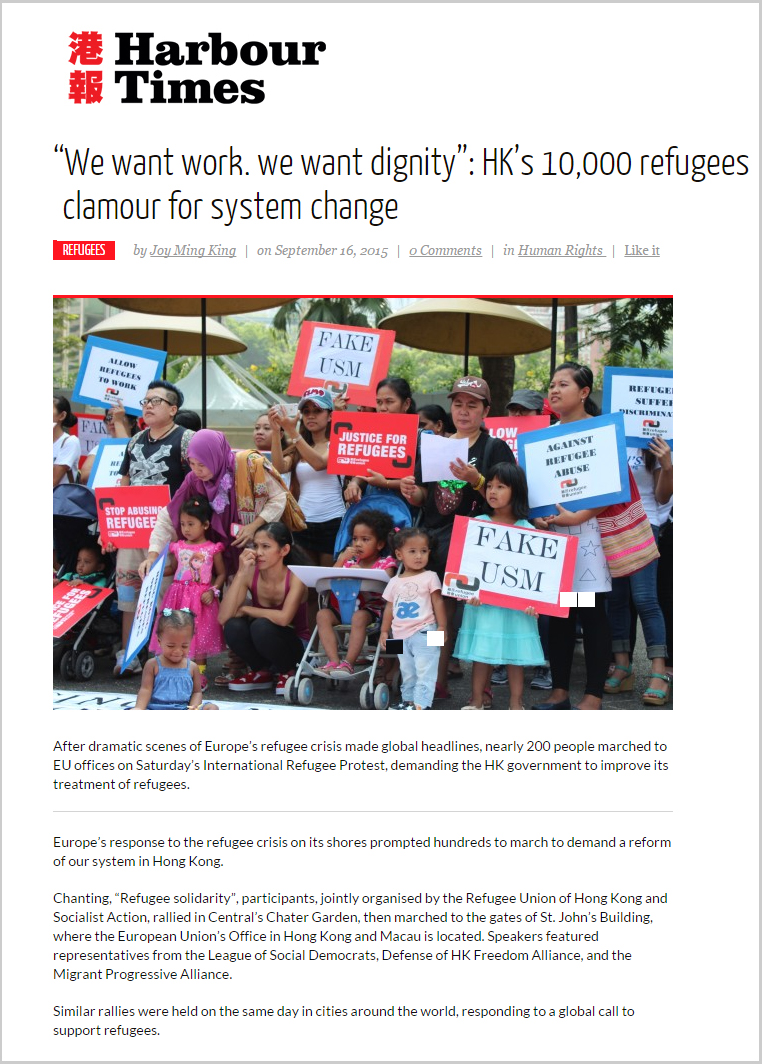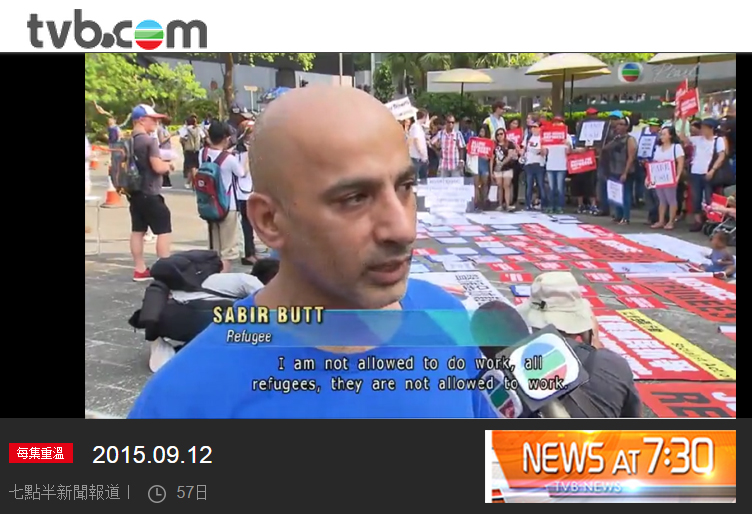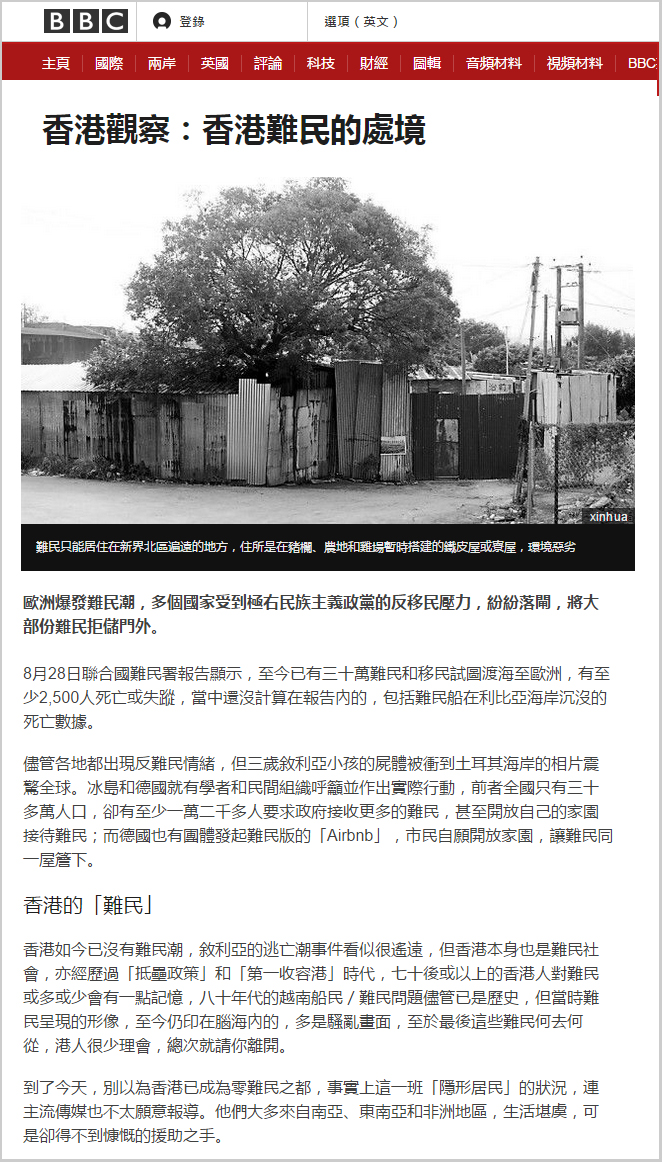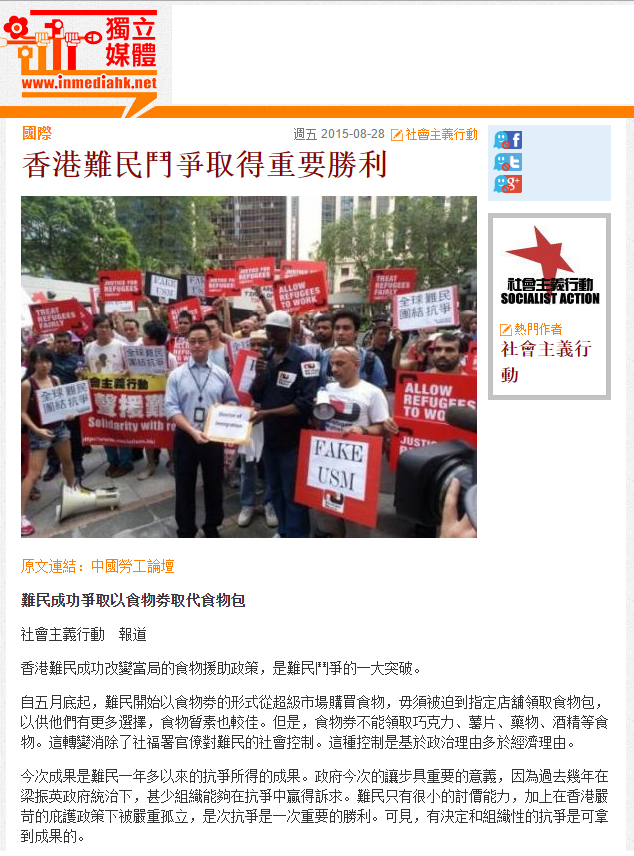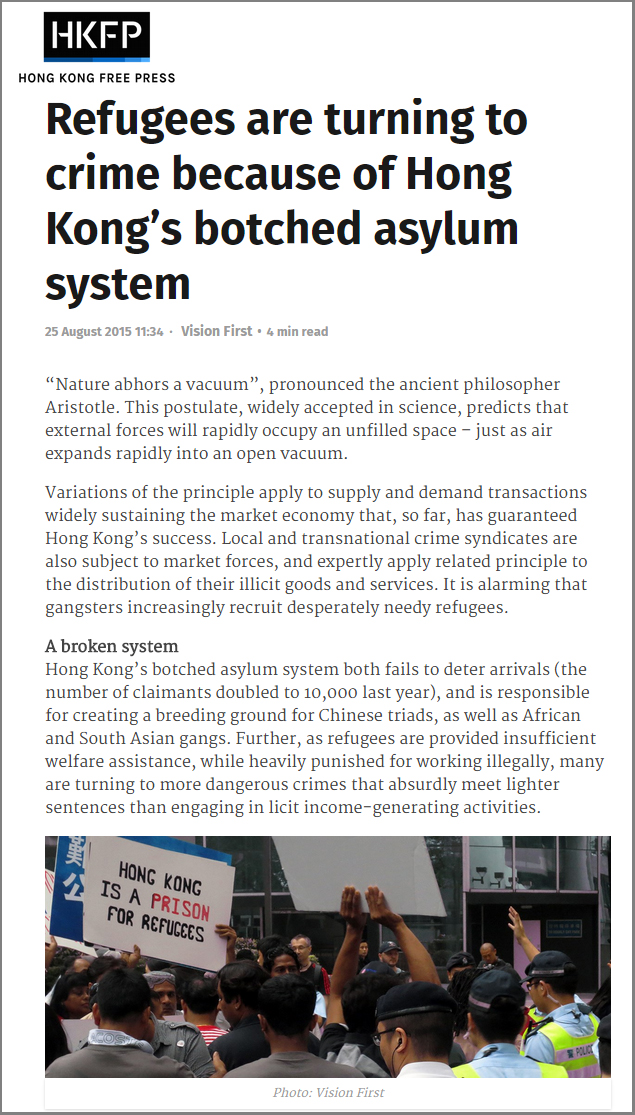No life, the refugee slums in Hong Kong
Sep 19th, 2015 | Housing, Immigration, Media, Racism, Rejection, Welfare | Comment
The plight of the refugees in Hong Kong, is the consequence of a system that isolates and leaves them in an endless waiting out of sight of the rest of the population in unsanitary slums. About 10,000 refugees live in of Hong Kong, mostly coming from Indian subcontinent, but also from Vietnam, Indonesia or Horn of Africa.
Most of them have fled persecution in their country, hoping to find refuge in Hong Kong. This city isn’t the haven they were hoping for. Hong Kong hasn’t signed the Geneva Convention and gives only a very small number of refugees status. Upon their arrival in Hong Kong, refugees are registered as asylum seeker and their passports are confiscated.
Normally, it takes three years to process their applications, but some are still waiting after eight years and they aren’t allow to work. Refugees have access only to tiny rooms in slums in the New Territories. Initially these slums weren’t made for housing, these are shacks,or former farms built or refurbished by unscrupulous owners.
List of 69 refugee slums exposed by Vision First since March 2013
A little empathy goes a long way
Sep 18th, 2015 | Housing, Welfare | Comment
Let us praise ISS-HK for promptly remedying a tense situation.
This week a distressed refugee couple requested our assistance after the ceiling collapsed in their room and they became homeless. The welfare policy for refugees offers a subsidy ($1500 a month) for premises rented directly from landlords through estate agents familiar with the ISS-HK procedure. In this case the couple had renewed the contract in February 2015 and were paying $200 a month on top of $3000 paid by ISS-HK to the landlord.
However, a lack of proper maintenance of the old and dilapidated building in To Kwa Wan caused the partial collapse of the ceiling. Refugees are forced to live in the cheapest rooms, often in the oldest walk-up buildings, if not in slums, where sudden structural damage might puts their lives at risk.
In this case, fortunately the refugee couple was unhurt. The landlord visited briefly, but, unconcerned about the welfare of his tenants, disappeared soon after and disconnected his phone. The couple felt bound by the Tenancy Agreement and was unsure about their obligations towards the landlord. With no money, nowhere to stay and food coupons damaged by the rain, the couple called their ISS-HK case officer for assistance.
The wife reported to Vision First that, on several occasions, she called their case officer asking for assistance. She complained that she was dismissed with remarks to the following effect: “I don’t have time”, “This is your problem, I cannot help you”, “I don’t care about your problem. I have many clients (to assist)”, “I am busy. Don’t come (to ISS-HK office). I will not see you”, “I will not visit (the room) because the building is dangerous”, “If you don’t like it, go back to your country.” After which the ISS-HK case-worker would hang up the phone
With dignity and composure, the wife explained to Vision First that death threats had driven her into exile, as if she needed to justify her vulnerability after being insulted by a professional tasked with and paid for her welfare. She was evidently less distressed by the inability to offer emergency accommodation, than by the crude and unwarranted remark: “Go back to your country!”
Vision First raised a complaint with ISS-HK and the same afternoon her case officer called the wife to remedy the situation. The thankful lady reported to Vision First, “My case officer said that she understood my situation and was sorry. She promised to do her best and asked me to collect dried food (emergency rations) and go to the office on Monday. I was very surprised when she gave me her mobile number and asked me to call if I needed anything.”
Irrespective of the inevitable difficulties and frustrations faced in our work, we are reminded that refugees are human beings who deserve to be treated with dignity. The principle that “every asylum claim ought to be approach as genuine until it is proven that it cannot be substantiated by the claimant,” makes any dismissive remark highly unattractive.
It is worth repeating that the High Court directed that, “a refugee claimant deserve sympathy and should not be left in a destitute state during the determination of his status. However, his basic needs such as accommodation, food, clothing and medical care are provided by the Government.”
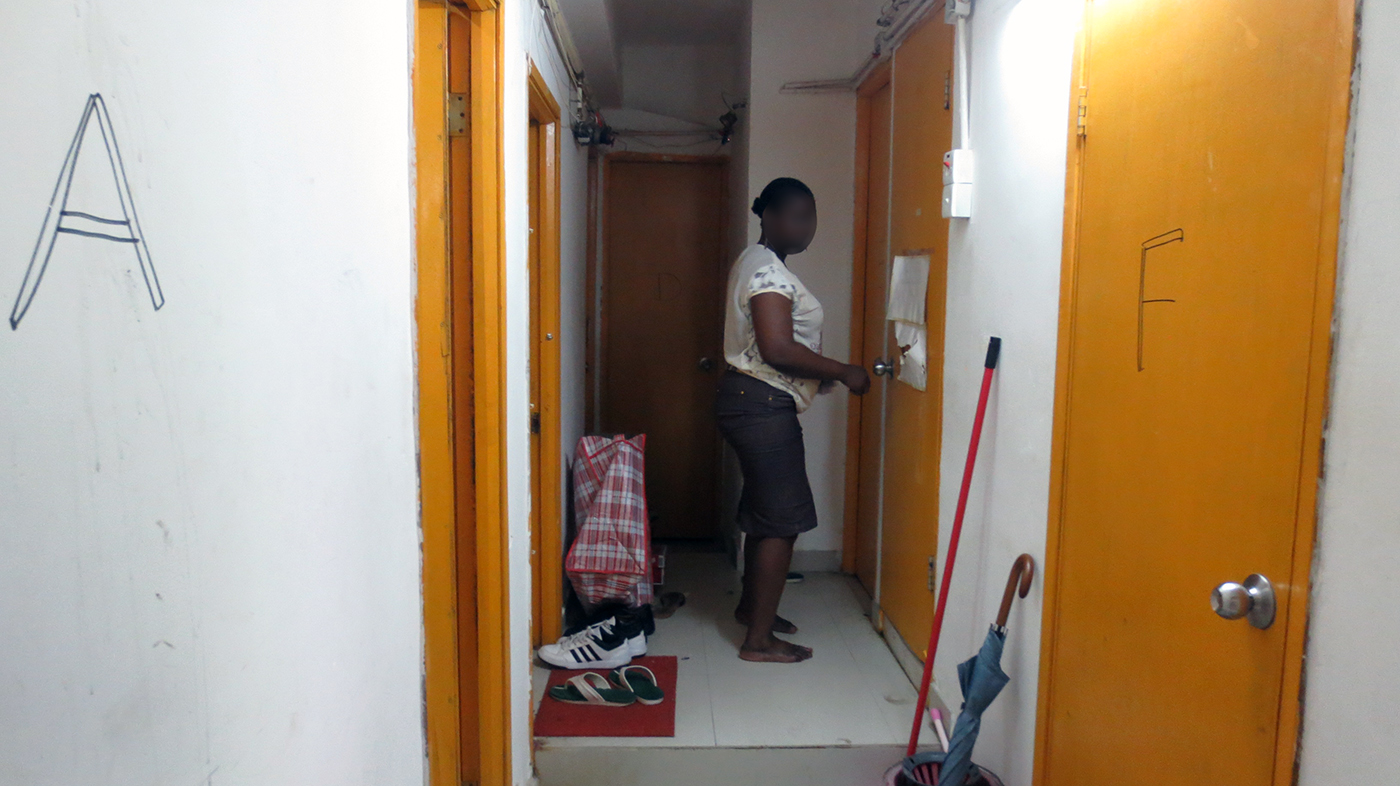
We want work, we want dignity
Sep 17th, 2015 | Immigration, Media, Refugee Community, Rejection, Welfare | Comment
TVB Evening News on refugee march to EU office
Sep 15th, 2015 | Immigration, Media, Rejection, Welfare | Comment
BBC – The Plight of Hong Kong Refugees
Sep 14th, 2015 | Immigration, Media, Rejection, Welfare | Comment
A local case of cruel, inhuman treatment and punishment?
Sep 10th, 2015 | Immigration, Medical, Rejection, VF Opinion, Welfare | Comment
In recent months the government has waged a war of words against asylum “abuse” in general and claimants arriving from India in particular.
Hong Kong might not be a city “of extraordinary compassion”, as Prime Minister David Cameron said about Britain, but crucially the High Court requires that, “a refugee claimant deserve sympathy and should not be left in a destitute state during the determination of his status. However, his basic needs such as accommodation, food, clothing and medical care are provided by the Government.”
Further, the Hong Kong Bill of Rights Ordinance unequivocally prescribes that, “No one shall be subjected to torture or the cruel, inhuman or degrading treatment or punishment” (Art. 3).
Despite such exquisite guarantees of refugee rights and government duty, in the evening of 22 August 2015, a destitute, starving, homeless and sick refugee collapsed in the streets of Jordan and was rushed unconscious by ambulance to Queen Elizabeth Hospital where he was treated for 18 days. The diagnosis was loss of consciousness, sepsis, psoriasis and alcohol dependence.
“I lost consciousness and hit my head,” recalls Singh, “Someone called an ambulance and I woke up in the hospital. I drank beer for the pain and itchiness of these sores covering all my body. It started small but got very worse [in the] six months [that] I waited for Immigration to give me new immigration paper. I had no help, no food and could not go to the clinic. For long time I sleep in the streets.”
In 2010 the Marine Police arrested Singh as he entered illegally from China. He was released from Immigration detention after lodging a torture claim based on his fear of death threats which has not yet been determined under the Unified Screening Mechanism (USM). Around May 2012 he lost his Recognizance Form 8 and stopped reporting to Immigration for fear of being deported.
A refugee friend recalls the night in March when he encountered him, “It was freezing cold. I saw a man shivering on a bench in the park. I asked where he was from and what happened. He told me he was from India. He was sick and very desperate. I offered him food and the next day I took him to the Refugee Union. Two days later I took him to Immigration to apply for a new paper.”
According to Singh and his friend, who speaks fluent English and assisted him throughout, Immigration was fully informed about Singh’ predicament and especially about his medical condition that an officer agreed “was very critical”. And yet Mr. Singh was told to wait “one or two weeks”, repeatedly, until he grew the suspicion that Immigration planned to arrest and deport him.
Ignorance of his rights exacerbated the suffering Singh endured until he lost consciousness. The asylum process however showed little sympathy and did not prevent destitution by providing essential shelter, food and, most critically, medical treatment. On one occasion Singh says, “My officer told me that if I want to go back to India they will arrange the ticket immediately.” Yet his request for a replacement Recognizance Form has been ignored since March 2015.
Queen Elizabeth Hospital compounded Singh’s ordeal by demanding $25,870 upon discharge and withholding essential medications until the bill was settled. The penniless and despairing refugee had no option but to walk out of the hospital in shame. “They told me to go to the clinic in Jordan for treatment, but first I must pay the hospital bill. How can I pay? I have no money,” he laments.
Paranoid by fears of abuse and anxious to reduce the number of asylum seekers, Hong Kong Government is waging a war of attrition against refugees with forced hardship deployed as the main weapon. This approach is deeply regrettable as the effect on asylum abusers is questionable, while the impact on the weakest refugees is obvious. The time has come for the authorities to look in a mirror and figure out why the asylum process is failing everyone – vulnerable refugees especially.
UPDATE – The day following this blog, Singh was issued with a new Recognizance Form and collected medication from Queen Elizabeth Hospital that waved all charges.
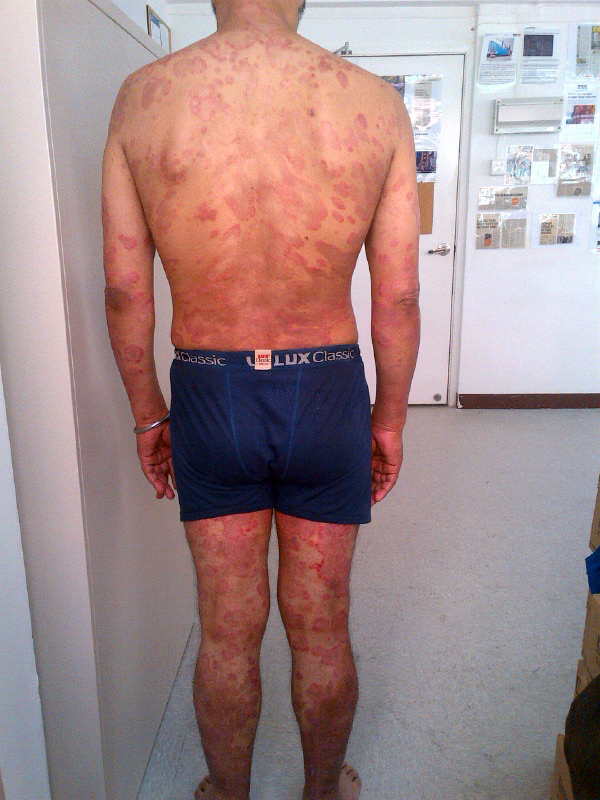
Who allows wolves in sheep’s clothing to hide among refugees?
Sep 7th, 2015 | Crime, Immigration, Personal Experiences, Refugee Community, Welfare | Comment
Hello, I am Outsider reporting again on the experiences of refugees in Hong Kong.
Recently there have been many news reports about criminals who lodge Unified Screening Mechanism (USM) claims with the Immigration Department, but might not have legitimate grounds for protection. This is an issue which deserves to be discussed. It raises the question: Who allows wolves in sheep’s clothing to hide among refugees?
Immigration officials recently informed journalists that several hundred USM claimants broke the law: since the beginning of the year 113 claimants were arrested for working illegally and 515 were involved in other crimes, amounting to about 6% of 10,000 outstanding claimants.
Conveniently no explanation was provide about the different backgrounds of the so-called criminals with asylum claims who were arrested. At a risk of oversimplification, I believe there are three major groups: 1) destitute USM claimants who perform legal work without permission; 2) impoverished migrants and troubled traders who cannot renew/obtain visas; c) gangsters abusing asylum to avoid removal and engage in criminal activity.
For the first group, government press releases and news reports are biased and unbalanced as they failed to make relevant distinctions. It is suggested that many USM claimants are criminals and troublemakers, yet the unfair reporting lacks context. For instance, we refugees rent subdivided rooms costing $2500-3500 (the cheapest are windowless 2x4m cubicle with shared facilities), but receive just $1500 in rent assistance since February 2014.
For subsistence reasons, including keeping a roof over our heads, many refugees are obliged to work. Any refugee stuck in Hong Kong more than six months, has probably worked here and there. Of course few dare to admit it. We simply have no choice. The government is mocking readers by calling us ‘criminals’, which brings to mind dishonest individuals breaking the law for easy money.
The reality is refugees do hard work in construction and recycling for 10-12 hours a day in very dangerous conditions for a rip-off $200-300 without insurance or medical cover. That is neither desired nor easy money. We must work to pay for ours and our family’s daily needs, in particular for our children. Don’t let the government fool you, it is the failed asylum policy that forces refugees to work without permission.
For the second group, there are several nationalities who enter Hong Kong with visitor or work visas which eventually expire. Previously they would leave and return with another visa which was problematic, expensive and time consuming. After discovering that USM allows them to remain for years with some assistance, they stop leaving and returning. They are not to blame. They probably suffer unbearable poverty without social services in their country and, after discovering a benefit, naturally seize the opportunity.
For the third group, there are hardened gangsters who resist deportation by lodging USM claims to avoid removal/detention and persist in their criminal ways. A few characters frankly explained to me that this was the only exploit to remain in Hong Kong. These abusers are thumbing their noses at a system that allows them to stay unchallenged for years. Their pockets lined with the real easy money, they entice dispossessed refugees to join their gangs.
Entering Hong Kong just to be an asylum seeker is not attractive. In fact, asylum seekers face years of intolerable hardship. Instead abusers and criminals are attracted by a failed asylum system that remains open to and indeed welcomes exploitation. These individuals find an open and unguarded environment in which they can achieve goals not related to asylum.
It appears that the government is deceptively singling out a minority 6% of arrested refugees to criminalize and degrade the law-abiding majority. A careful review of recent news reports suggest that the Government is blaming everyone – refugees, smugglers, lawyers and interpreters – without considering its responsibility towards a policy that fails refugees. The USM appears not to benefit society (tax-burden and security risk), while it allows the government to maintain an established policy of not granting asylum.
Dear readers, if the USM processed asylum claims credibly and fairly within 6 months rather than the claimed average of 2-3 years (more like 5-10), would it be approved by refugees? Would it benefit society? Would it limit the cost and social risk? Would it continue to harbour wolves in sheep’s clothing?

Refugees are turning to crime because of Hong Kong’s botched asylum system
Aug 25th, 2015 | Crime, Immigration, Rejection, VF Opinion, Welfare | Comment
A tale of two cities – fabulously wealthy or agonizingly destitute?
Aug 18th, 2015 | Advocacy, Food, Housing, Refugee Community, Welfare | Comment
The police arrived to mediate the stand-off in what has regrettably become an all too frequent scene at the headquarters of the Social Welfare Department, the department entrusted with the physical wellbeing of about 10,000 refugees in the city. After listening to complaints, a community relations officer called out, “How many people are homeless?”
What happened next was symptomatic of the sickness that pervades our society – unnoticed and unassisted the poor agonize among the affluent. In the overcrowded and guarded lobby of the SWD, 20 unintimidated men and women raised a hand. “Homeless people are a crime risk as they might commit offenses out of desperation,” a concerned police officer whispered.
Nevertheless, this warning appears to be largely ignored in the offices of the Security Bureau, the mastermind behind refugee policies in Hong Kong. This semi-autonomous global city follows a precept that is plainly depicted in its distrust towards the poor that frequently makes the news.
Two visitors recently arrived in Hong Kong. One was the business magnate Jack Ma, the richest man in China and founder of the fabled e-commerce company Alibaba. The other was the less prominent Jagadeep, who claims to be a victim of the “corruption that is eating away at India like a termite and is coming from the top”, as Indian Premier Modi lamented. Two visitors with two experiences worlds apart.
It was reported in the press that Jack Ma purchased a fabulous home on Hong Kong’s Peak for an eye-watering HK$1.5 Billion – the second most expensive property purchase in the history of the city. Government rules and regulations facilitate the entry into Hong Kong for the wealthy, who are shamelessly feted and encouraged to spend, purchase and invest to their heart’s content.
Jagadeep’s experience was less wonderful and included several weeks of homelessness. He was granted a one week visa which he was obliged to overstay to seek asylum, thus committing his first offense. He was then detained for a month and pressured to depart by the Immigration that is struggling with 10,059 asylum seekers shamefully homogenized into a melting pot of distrust, vilification and rejection.
It is a tale of two cities. Jack Ma surely deserves to enjoy the fruits of his success from the balcony of his new mansion overlooking Victoria Harbour. Part of his purchasing price was HK$12,750,000 in stamp duty paid into government coffers to fund policies that include the Social Welfare Department’s “Provision of Assistance-in-kind for Asylum Seekers and Torture Claimants”.
Like an anxious billionaire terrified of becoming poor in 20 years, Hong Kong Government is obsessed with hoarding HK$734 Billion in fiscal reserves and abstaining from alleviating poverty among those who today don’t have food and shelter. Shoulder to shoulder with 1.3 million impoverished Hongkongers, stand Jagadeep and 10,000 refugees who “we will continue to ensure do not fall destitute whilst in Hong Kong,” claims misleadingly the Security Bureau.
One of a hundred refugees who protested on 17 August 2015 at the SWD head-office begs to disagree, “The government pretends not to see our suffering. But they know our needs and our pain. They created this system. They know $1500 is not enough for rent in this expensive city. They know $1200 is not enough to eat for a month. They use (policies) to oppress refugees.”
A Refugee Union leader, who claims his basic needs are not met, exclaimed, “The government says we are not allowed to work. They say they give us enough rent and enough food, but they are lying. They delay (decisions on) our claims for 10 years and keep us here. We are dying. Hungry people are angry people. You can go ahead and lock all of us in jail. What difference does it make?”
More angry voices would not be suppressed: “You see our children? We are in starvation. You make us suffer”, “Hong Kong pretends to be an international city, but this is a ghost city”, “They just pay for a system that abuses and rejects refugees”, “They know what is wrong, they know what is right, but they are not thinking about us”, “You can drink our blood, but drink it small and don’t kill us!”
“We will fight for our rights until there is change” promised an empowered Refugee Union member. But Vision First has serious reservations this is achievable in the near future. It is heartbreakingly obvious that Hong Kong Government turns a blind eye to the destitute, resident and otherwise, while crushing refugees behind bureaucratic lies supported by preposterous assurance that nobody will fall destitute while seeking asylum in the city that Jack Ma loves.


